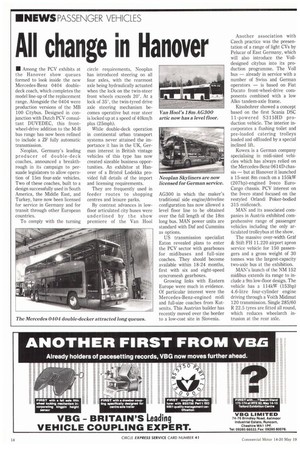All change in Hanover
Page 16

If you've noticed an error in this article please click here to report it so we can fix it.
• Among the PCV exhibits at the Hanover show queues formed to look inside the new Mercedes-Benz 0404 doubledeck coach, which completes the model line-up of the replacement range. Alongside the 0404 were production versions of the MB 100 Citybus. Designed in conjunction with Dutch PCV consultant DUVEDEC, this frontwheel-drive addition to the M-B bus range has now been refined to include a ZF fully automatic transmission.
Neoplan, Germany's leading producer of double-deck coaches, announced a breakthrough in its campaign to persuade legislators to allow operation of 15m four-axle vehicles. Two of these coaches, built to a design successfully used in South America, the Middle East, and Turkey, have now been licensed for service in Germany and for transit through other European countries.
To comply with the turning circle requirements, Neoplan has introduced steering on all four axles, with the rearmost axle being hydraulically actuated when the lock on the twin-steer front wheels exceeds 20°. At a lock of 35°, the twin-tyred drive axle steering mechanism becomes operative but rear steer is locked up at a speed of 40km/h plus (25mph).
While double-deck operation in continental urban transport systems never attained the importance it has in the UK, German interest in British vintage vehicles of this type has now created sizeable business opportunities. An exhibitor at Hanover of a Bristol Lodekka provided full details of the import and licensing requirements.
They are frequently used in feeder routes to shopping centres and leisure parks.
By contrast advances in lowfloor articulated city buses were underlined by the show premiere of the Van Hoot AG300 in which the maker's traditional side engine/driveline configuration has now allowed a level floor line to be obtained over the full length of the 18m long bus. MAN power units are standard with Daf and Cummins as options.
US transmission specialist Eaton revealed plans to enter the PCV sector with gearboxes for midibuses and full-size coaches. They should become available within 18-24 months, first with six and eight-speed syncromesh gearboxes.
Growing links with Eastern Europe were much in evidence. Of particular interest were the Mercedes-Benz-engined midi and full-size coaches from Kutsenits, This Austrian builder has recently moved over the border to a low-cost site in Slovenia. Another association with Czech practice was the presentation of a range of light CVs by Pelucar of East Germany, which will also introduce the Volldesigned citybus into its production programme. The Voll bus — already in service with a number of Swiss and German operators — is based on Fiat Ducat° front-wheel-drive components combined with a low Alko tandem-axle frame.
Kassbohrer showed a concept based on the first Scania DSC 11-powered S31511D production vehicle. The interior incorporates a flushing toilet and pre-loaded catering trolleys loaded and offloaded by a special inclined lift.
Kowex is a German company specialising in midi-sized vehicles which has always relied on the Mercedes-Benz 0614D chassis — but at Hanover it launched a 15-seat 8m coach on a 155kW (207hp)-engined Iveco EuroCargo chassis. PCV interest on the Iveco stand focused on the restyled Orlandi Poker-bodied 315 midicoach.
MAN and its associated companies in Austria exhibited comprehensive range of passenger vehicles including the only articulated trolleybus at the show.
The massive over-width Graf & Stift FH 11.220 airport apron service vehicle for 150 passengers and a gross weight of 30 tonnes was the largest-capacity two-axle bus at the exhibition, MAN's launch of the NM 152 midibus extends its range to include a 9m low-floor design. The vehicle has a 114kW (153hp) 4.6-litre four-cylinder engine driving through a Voith Midimat 120 transmission. Single 285/60 R 22.5 tyres are fitted all round, which reduces wheelarch intrusion at the rear axle.




































































































